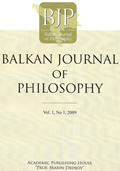Semantic Suppositions in Frege’s Definition of Natural Number
Semantic Suppositions in Frege’s Definition of Natural Number
Author(s): Constantin StoenescuSubject(s): Philosophy
Published by: Институт по философия и социология при БАН
Keywords: Frege; logic as a language; context principle; definition by abstraction; sense and reference; structural.
Summary/Abstract: Was Frege firstly a philosopher of language or a philosopher of mathematics? I try to give an answer to this question in this paper. I argue that Frege’s definition of natural number is the right way to reach the answer. Frege had simultaneously two theoretical commitments: one regarding the logicist programme in the foundations of mathematics, the other regarding the conception of logic as a language. Therefore, Frege developed a formal language and tried to define arithmetical concepts in pure logical terms. He did this based on semantical suppositions, because he could not do it any other way as long as he regarded logic as a language. I will argue that Frege used semantic tools in order to solve problems related to philosophy of mathematics.
Journal: Balkan Journal of Philosophy
- Issue Year: VI/2014
- Issue No: 2
- Page Range: 127-136
- Page Count: 10
- Language: English

